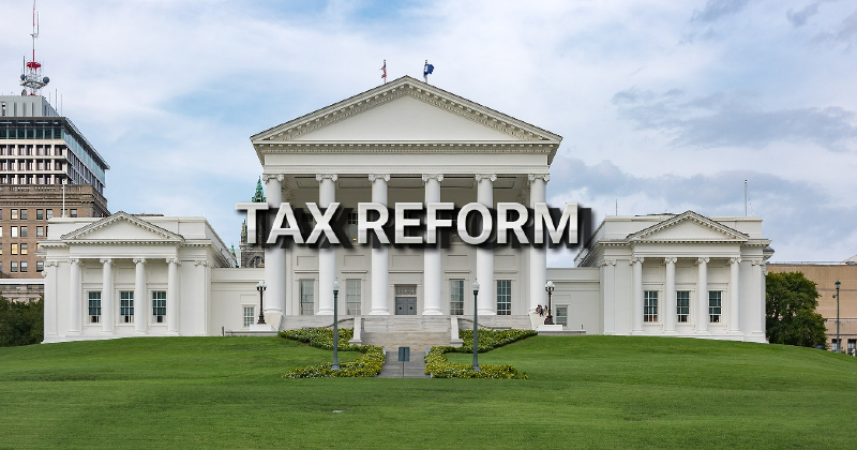The American linguist Yogi Berra once said of a New York City restaurant: “Nobody goes there anymore. It’s too crowded.”
Overcrowding, however, isn’t what motivates a move to a state (or from a state). Those decisions are inspired by robust economic activity, jobs for residents, and a pathway for each generation to do better than their parents did. People move for a job, for higher pay, for lower cost of living, or for a better education.
Like our forebears, American still go where opportunity takes them. Migration is a reflection of the opportunities available in a state’s economy.
This is the biggest reason behind Governor Glenn Youngkin’s 2023 tax proposal. For nine of the last ten years, Virginia’s net migration has been negative. During that time, more people have left the state – 134,500 — than have moved here.
Worse, those from other states are going elsewhere: In the most recent Census estimates for the year ending July 1, 2023 North Carolina picked up more than 97,000 residents. Florida, more than 194,000. Texas has been the beneficiary of nearly 187,000 expats from the rest of the country and nearby Tennessee’s population swelled by more than 63,000.
Regionally, Virginia is losing the competition for residents, too. Of the five states bordering the Commonwealth, four of them saw a combined net inflow of more than 173,000 residents. People “vote” with their feet.
Admittedly, we might have done worse. Illinois saw a net 84,000 Illinoisans move out. A net 338,000 Californians left the Golden State. More than 200,000 New Yorkers decided they couldn’t make it there, so they’d make it somewhere else.
A common factor: The states Americans are leaving are among those with the highest state income tax rates; the states Americans are flocking to are among those with the lowest.
What is particularly dangerous for high tax states is that high income earners, who pay the most in taxes to support government services, are the ones leaving California, New York, Illinois and elsewhere. The fact that many are not only wealthy but young poses another set of challenges.
California alone lost $29.1 billion in adjusted gross income from population migration in 2021, losing nearly 40,000 residents with graduate or professional degrees. The early signs are starting to be seen in Virginia, too, where the state lost nearly 7,000 net residents with bachelor’s degrees – with median lifetime earnings of $2.8 million — and another 3,400 with master’s degrees (lifetime earnings: $3.2 million). That’s a lot of brain power (and tax revenue) lost.
Youngkin is working to avoid that by making Virginia attractive through a reduced tax burden … along with recognizing the Commonwealth’s current revenue system doesn’t reflect a changed economy. A revenue system designed when Fairfax County was one of the largest dairy counties in the state doesn’t reflect today’s reality, when 70 percent of the world’s internet traffic passes through Fairfax and Loudoun Counties.
That changing economy was acknowledged by the liberal Commonwealth Institute for Fiscal Analysis in 2017 when it noted “Virginia’s current revenue system isn’t keeping up with changes and growth in the overall economy, and that’s putting the future prosperity of families and businesses at risk.”
The report it issued stated that Virginians’ spending on goods had declined from 37.3 percent in 2000 to 31.7 percent fifteen years later, and concluded “Virginia needs to modernize its tax code by adding more services to the sales tax base and passing legislation to improve sales tax collections connected to online and digital purchases.”
While the underlying assumption was correct, the goal of The Commonwealth Institute’s paper was to figure out ways to get more money from Virginia’s taxpayers. Youngkin’s is a different agenda: balance out Virginia’s revenues, reflect modern markets, and provide tax relief to make the Old Dominion more attractive in the new economy.
The proposal he submitted to the General Assembly is a mix of triangulated ideas: Reduce individual income tax rates by 12 percent across the board, increase the sales tax rate by less than one percentage point and expand the sales tax base by including “new economy products” like streaming and software, and expand the Earned Income Tax Credit to 25 percent of the federal credit.
Together, he notes, these proposals will put an extra $141 in the pocket of a single parent earning $35,000 with one child; $243 for a married couple earning $75,000 with children.
By proposing a mix of tax base expansion with tax rate reduction, even Richmond Times-Dispatch columnist Jeff Shapiro, never confused for a MAGA Republican, acknowledges “Youngkin is breaking the mold.”
But Senate Democrats instantly attacked the proposal as “absolutely disgraceful” and “a slap in the face of our most vulnerable individuals.” This comes from the same worthies who resisted increasing Virginia’s standard deduction (which ended the practice of taxing those earning as little $4,000 a year), oppose calls to end the car tax (which hurts low-income Virginians the most), and were quick to put Virginia on the road to higher taxes last time they controlled the General Assembly. One might be forgiven for concluding their concern for the poor had more to do with politics than with poverty.
Perhaps Senate Democrats view blocking the tax bill as an extension of their “Blue Wall” against all things Youngkin. But while Virginia’s economy remains slowly growing, visionary leadership demands looking not at where we are but at where we want to be – and how we should get there.
My colleague, Steve Haner, has correctly been critical of the failure to properly lay the foundation for a robust reform of this nature, but there is still time to engage in serious conversation and get the ball rolling. Stimulating economic growth and encouraging migration of new residents and businesses is long overdue. The General Assembly should not waste this opportunity to begin the work.

Chris Braunlich is Senior Advisor and former president of the Thomas Jefferson Institute for Public Policy. He may be reached at chris@thomasjeffersoninst.org.






